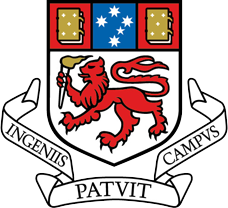The Higher School Certificate (HSC) is the credential awarded to secondary school students who successfully complete senior high school level studies in New South Wales and some ACT schools in Australia, as well as some international schools in Singapore, Malaysia, Indonesia, China, and Papua New Guinea. It was first introduced in 1967, with the last major revision coming into effect in 2019. It is currently developed and managed by the NSW Education Standards Authority (NESA).

The University of Tasmania (UTAS) is a public research university, primarily located in Tasmania, Australia. Founded in 1890, it is Australia's fourth oldest university. Christ College, one of the university's residential colleges, first proposed in 1840 in Lieutenant-Governor Sir John Franklin's Legislative Council, was modelled on the Oxford and Cambridge colleges, and was founded in 1846, making it the oldest tertiary institution in the country. The university is a sandstone university, a member of the international Association of Commonwealth Universities, and the Association of Southeast Asian Institutions of Higher Learning.
The education system in Tasmania comprises the education of children from their early years, through kindergarten, primary and high school, and tertiary education in universities and vocational education and training organisations. The system is delivered by the government-run K–12 schooling system, and numerous independent schools and colleges, most of which are controlled or sponsored by religious organisations. Public education in Tasmania is managed primarily by the Department for Education, Children and Young People. The Department is responsible for all aspects of education in Tasmania including schooling, adult education, the State Library and TasTAFE, a vocational tertiary institution with many campuses around the state.
Bachelor of Philosophy is the title of an academic degree that usually involves considerable research, either through a thesis or supervised research projects. Unlike many other bachelor's degrees, the BPhil is typically a postgraduate degree awarded to individuals who have already completed a traditional undergraduate degree.
University admission or college admission is the process through which students enter tertiary education at universities and colleges. Systems vary widely from country to country, and sometimes from institution to institution.
The Equivalent National Tertiary Entrance Rank (ENTER) was the national Australian tertiary entrance rank, administered by Universities Australia. It was a percentile ranking, designed to simplify the comparison of entrance levels for students educated in different processes of admission for university applicants from interstate. It was replaced by the Australian Tertiary Admission Rank from 2010.

The Australian Qualifications Framework (AQF) specifies the standards for educational qualifications in Australia. It is administered nationally by the Australian Government's Department of Industry, with oversight from the States and Territories, through the Standing Council of Tertiary Education Skills and Employment. While the AQF specifies the standards, education and training organisations are authorised by accrediting authorities to issue a qualification.
The Tertiary Entrance Rank (TER) was a tertiary entrance score used in several Australian states, the ACT and the Northern Territory as a tool for selection to universities in Australia. As of 2010, it has been replaced by the Australian Tertiary Admission Rank in all states and territories.

Elizabeth College is a government comprehensive senior secondary school located in Hobart, Tasmania, Australia. Established in 1911 as the Elizabeth Street School and known as Elizabeth College since 1985, the college caters for approximately 800 students in Years 11 and 12 and is administered by the Tasmanian Department of Education.
The Western Australian Certificate of Education (WACE) is the credential awarded to students who have completed senior secondary education in the state of Western Australia. It is the Western Australian graduation certificate of the Australian Senior Secondary Certificate of Education. Students are required to meet various breadth and depth requirements, achievement standards and literacy and numeracy standards across their final years of schooling. As of the 2020 WACE, there are 106 courses available for students to study. Many WACE students are awarded an Australian Tertiary Admission Rank (ATAR), summarising their results across all areas of study into one ranking for the purposes of university admission. Students may choose from ATAR courses, which count directly towards their ATAR, Vocational Education and Training courses, which are more practical courses and can lead to further vocational opportunities, and, from 2021, General courses, which provide pathways to university, employment, or further vocational education and training. From 2010, the WACE replaced the Tertiary Entrance Exam (TEE), as the standard academic examination for school leavers in Western Australia.

Newstead College is a government comprehensive senior secondary school located in Newstead, a suburb of Launceston, Tasmania, Australia. Established in 1997, the college caters for approximately 500 students in Years 11 and 12. The college is administered by the Tasmanian Department of Education.
Huonville High School is a government co-educational comprehensive secondary school located in Huonville, a town to the south of Hobart, Tasmania, Australia. Established in 1940, the school caters for approximately 400 students from Years 7 to 12. The Tasmanian Department of Education administers the school.
The West African Senior School Certificate Examination (WASSCE) is a type of standardized test in West Africa. Students who pass the exam receive a certificate confirming their graduation from secondary education. It is administered by the West African Examinations Council (WAEC). It is only offered to candidates residing in Anglophone West African countries. The academic school-leaving qualification awarded upon successful completion of the exams is the West African Senior School Certificate.

The A-level is a subject-based qualification conferred as part of the General Certificate of Education, as well as a school leaving qualification offered by the educational bodies in the United Kingdom and the educational authorities of British Crown dependencies to students completing secondary or pre-university education. They were introduced in England and Wales in 1951 to replace the Higher School Certificate. The A-level permits students to have potential access to a chosen university they applied to with UCAS points. They could be accepted into it should they meet the requirements of the university.

Don College is a government comprehensive senior secondary school located in Devonport on the north-western coast of Tasmania. "The Don", as it is commonly known to residents of Devonport, is situated by the Don River and enjoys views over the river and surrounding forest reserve. The college caters for approximately 800 students in Years 11 and 12 and is administered by the Tasmanian Department of Education. Don College attracts students from Penguin and Deloraine.

Education in Western Australia consists of public and private schools in the state of Western Australia, including public and private universities and TAFE colleges. Public school education is supervised by the Department of Education, which forms part of the Government of Western Australia. The School Curriculum and Standards Authority is an independent statutory authority responsible for developing a curriculum and associated standards in all schools, and for ensuring standards of student achievement, and for the assessment and certification according to those standards.

The Australian Tertiary Admission Rank (ATAR) for all domestic students, or the ATAR-based Combined Rank (CR) for all International Baccalaureate (IB) students, are the primary criteria for determining the Selection Rank (SR) for admission into undergraduate courses in Australian public universities. Domestic Students are students who are Australian or New Zealand citizens, or Australian permanent residents, or the holder of long-term refugee visa. ATAR & CR are not applicable for international students as they must apply directly to each university separately and their SR is calculated by the university. The ATAR is calculated by each state or territory's own state-level Tertiary Admission Center (TAC) for all domestic students studying within their geographical limits. Interstate Domestic Students must apply to the TAC of their respective state. The Selection Rank is calculated by each University separately based on the ATAR or CR as well as additional points for each university's unique criteria such as a student's educational disadvantage or subject performance. ATAR is not a mark, but rather a percentile ranking between 0.00 and 99.95 which shows the student’s relative position compared to all other students in the range of 16 to 20 years old who would have completed their respective year 12 exams in that state in a year.

The College of Arts, Law and Education was founded in 2017 as a college of the University of Tasmania that incorporated the School of Humanities, the School of Social Sciences, the School of Creative Arts and the Faculties of Law and Education. The College offers undergraduate, postgraduate and research programs.
A high school diploma is a diploma awarded upon graduation of high school. A high school diploma is awarded after completion of courses of studies lasting four years, typically from grade 9 to grade 12. It is the school leaving qualification in the United States and Canada.









